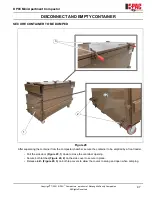
KP03 Mini Apartment Compactor
MAINTENANCE
57
Copyright
©
7/2021 K-PAC
™
Compactors, a product of McLaughlin Family Companies
All Rights Reserved
GENERAL MAINTENANCE TIPS
OIL
Even if high-grade oil was installed at start-up, oil does become contaminated in time. Watch for discoloration,
foaming or change in viscosity. Ambient conditions as to heat or foreign materials will contribute to problems.
Dust and chemicals can be drawn into system vents.
FILTERS
After the start-up of a new system, filter and strainers need very special attention. Chips from pipe threads,
metal particles, and other foreign materials can be introduced during hook-up. Clean or replace filter elements
after the first month of operation.
RELIEF VALVES
The relief valve is the greatest source of pump and system protection. Likewise, the relief valve is usually the
first item to give a warning of other problems. This valve is designed to fail open, or “fail-safe”. Relief valve
malfunction is most often due to contaminants in the fluid. This is a good time to clean up the system; flush-out,
change filter, open and clean any valve passages if necessary.
PUMP
Pump noise is a definite sign of trouble. Check shaft alignment and condition of coupler first. Cavitation is
another cause of pump noise. Check for a restricted suction line, undersized pipes if altered, or dirty filter or
strainer. Look for a suction line leak, air getting into the suction line by way of the plumbing or low oil supply will
cause pump noise as well as erratic and noisy valves. Finally, a worn pump will also feel hotter than the surface
of the reservoir. System pressures will drop and cycle rates will become slower. If pump is replaced, be sure to
change filters and check out the entire system during down time. Also, check cleanliness of oil at this time.
HEAT
Heat will be developed by all mechanical devices. The amount of heat will depend upon the use, duty cycle,
proper adjustment, age, etc. Hydraulic power packs usually can throw off any excess heat by way of the
surfaces of the plumbing and reservoir. Hydraulic power packs should operate in the range of 140° maximum,
160° absolute maximum.
If your new power pack operates too hot, be sure you are using the correct viscosity range and high-grade oil
specification. Also important that the oil level is up in the reservoir. Check for any partially open by-pass valves.
Check for worn directional valves or leaking cylinders. Internal-system leaks at high pressure are the greatest
source of heat.

































